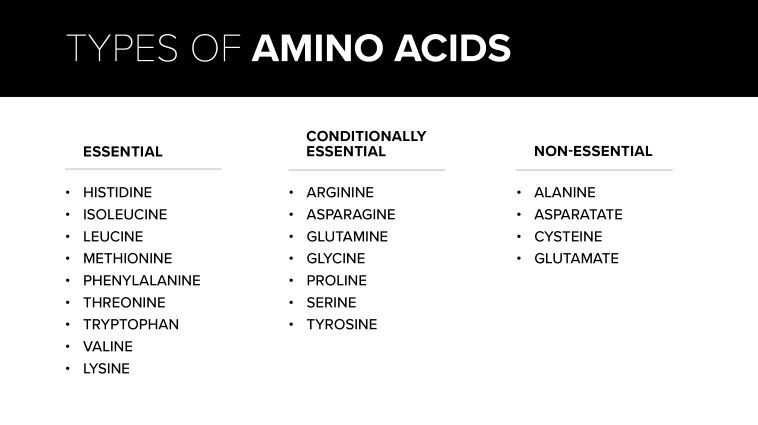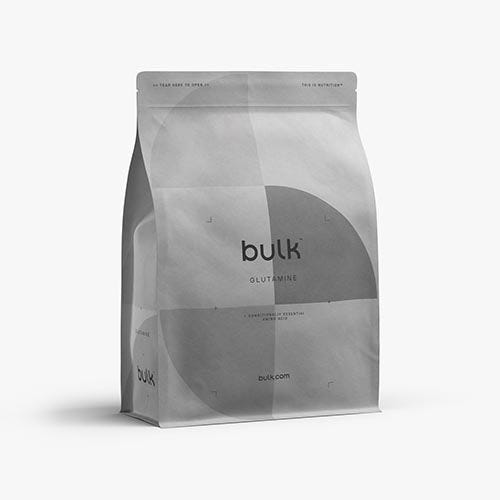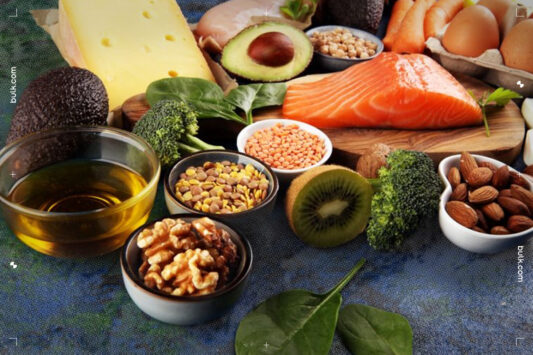What is Glutamine?
Glutamine is the most abundant amino acid in your muscles, accounting for over 60% of skeletal muscle tissue. It’s a ‘non-essential’ amino acid because it’s produced naturally in the body. However, when the body is under stress, you may need more glutamine than your body can create. For example, if you’re injured or ill, consuming additional glutamine from your diet or supplements can be beneficial to support recovery. For this reason, it’s argued that glutamine is a ‘conditionally essential’ amino acid. In this article, we’ll give you the ultimate guide to glutamine; and discuss the benefits and safety of glutamine supplements.

Related Products
How Does it Work?
Due to its abundance in muscle tissue, glutamine is a popular supplement for its role in supporting muscle maintenance and protein synthesis. It’s also vital for maintaining a healthy immune system as glutamine is a critical fuel source for immune cells such as white blood cells and intestinal cells.
Glutamine circulates throughout the body in the blood, with many cells relying on glutamine for their energy to function effectively. Your immune system also prefers glutamine as a fuel source as it breaks down quicker than glycogen. Glycogen is carbohydrates broken down into the simplest form and used as an energy store. Glutamine also plays an important role in brain health and is believed to increase natural hormone levels, which is key for muscle mass. What’s more, glutamine has a unique role in intestinal health which we discuss further later.
Who Will Benefit From It?
If you train hard (approaching the threshold of overtraining), you put your body under significant stress. Based on the studies, supplementing with glutamine is beneficial to bolster your immune system and to reduce the likelihood of your body becoming catabolic if it is deficient. This is particularly important if you’re eating in a caloric deficit to help reduce the possibility of your body turning to muscle as a source of glutamine. It’s also needed alongside other amino acids to stimulate muscle growth. So, if you’re veggie or not getting enough protein in your diet, then supplementing with glutamine is a must.
Older athletes who train regularly would benefit from glutamine supplementation as our ability to synthesise glutamine decreases as we age. Glutamine benefits anyone who exercises regularly and those who want to boost their immune health. Due to glutamine’s benefits for gut health, glutamine is also beneficial for anyone struggling with IBS or other gut health issues. However, you should discuss this with your doctor before starting to take glutamine or other supplements.
When is the Best Time to Take Glutamine?
Taking glutamine post-workout is considered the most beneficial time because your glutamine levels will be at their lowest. However, many people also supplement in the morning or before bed. Glutamine is also a popular intra-workout supplement as it is often found in formulas with other amino acids.
Dosage
For moderate training, it’s recommended to consume the standard glutamine dosage of 5g per day, post-workout ideally. If you train intensively, your glutamine levels will be more depleted, and a dosage of 10-15g per day should be enough. However, you should start taking glutamine with a dose of around 5g a day to begin.
It’s also worth bearing in mind that many foods contain glutamine, which will also contribute to your daily intake. On average, a typical diet may contain between 3-6g glutamine per day; however, this may vary depending on the quantity and type of foods eaten.
What are the Benefits?
Glutamine plays a vital role in several functions in the body when at rest, during intensive physical exercise and during periods of illness and disease. It’s a popular supplement due to the many potential health and performance benefits it provides, such as:
Recovery
Frequently training at a high intensity can make you more susceptible to illnesses such as the common cold and other respiratory tract infections. Research shows that athletes can benefit from glutamine supplementation to decrease muscle soreness and speed up recovery time. Glutamine plays a vital role in controlling glucose (energy) uptake after exercise, helping to restore energy stores for your next workout. When muscles have sufficient glucose stores, this helps you improve your performance and stay energised for longer, leading to better results.
Muscle Maintenance
After intense exercise, glutamine levels in the body reduce significantly. When the body needs more glutamine than it can produce, this results in glutamine depletion. During this state, your body can metabolise muscle glutamine to support the rest of the body. This can lead to your body going into a catabolic state. So, if you’re training to grow muscle, but your glutamine levels are low, this can result in muscle tissue breaking down to provide energy. For this reason, glutamine is a staple supplement for anyone looking to maintain muscle mass during intense and/or frequent training.
Immune Support and Gut Health
The benefits glutamine provides to the immune system are directly linked to its role in gut health. The intestines are considered the most significant immune organ in humans. This is due to the many cells in the intestines and immune functions, along with the trillions of bacteria that live in the gut and impact immune health. Glutamine is a vital source of energy for intestinal and immune cells. Glutamine also helps to protect against a leaky gut by maintaining a protective barrier inside of the intestines. This prevents harmful bacteria or toxins from moving into the rest of the body from the intestines. Therefore, glutamine may benefit your overall immune health by supporting intestinal cells.
What are the Different Types of Glutamine?
Glutamine exists in the form of L-glutamine or D-glutamine, which only differ in their chemical structure. L-glutamine is an isomer of glutamine, meaning it has a slightly different arrangement of atoms as a molecule. While L-glutamine has many functions in the body, D-glutamine appears to be comparably unimportant in living organisms.
This article discusses the specific functions, health benefits, and possible side effects of L-glutamine as this is the form found in foods and supplements. The terms glutamine and L-glutamine are often used interchangeably. Some supplements are listed as L-glutamine, whereas others use the simpler term of glutamine.
What Foods Contain Glutamine?
Glutamine is in almost every type of animal-derived protein you eat, such as meat, fish, dairy, eggs, whey, and casein. Therefore, focussing on getting enough protein in your overall diet is a simple way of increasing the amount of glutamine you consume. You can also find glutamine in vegetarian foods such as beans, tofu, lentils, spinach, cabbage, and beets.
What are the Effects on Muscle maintenance and Exercise Performance?
Glutamine does not build muscle; however, it supports muscle growth and fat loss in several ways. Firstly, glutamine plays a role in muscle protein synthesis – the process in which protein is produced to repair and build muscle after exercise. This is the opposing process to muscle protein breakdown, in which protein is lost as a result of training and muscle is broken down as fuel. You’re at a greater risk of this happening if you’re eating in a caloric deficit.
Glutamine also speeds up and improves recovery after exercise, which supports effective muscle growth as you’re less sore and able to train hard more regularly. Finally, glutamine can significantly increase your body’s production of growth hormone. As the name suggests, this hormone is directly linked to growing muscle tissue.
What Supplements are Available at Bulk™?
Now that we’re nearing the end of this guide to glutamine, it’s time to take a look at the top glutamine supplements available at Bulk™:
– Glutamine Powder
– Glutamine Peptides
– N Acetyl L Glutamine
Are There any Side Effects?
There are few potential side effects to taking glutamine daily as it’s made by the body and also present in many foods. Studies on glutamine supplementation have used a variety of doses, from around 5g up to high doses of approximately 46g daily for six weeks. While no negative side effects were reported with the high dosage, blood safety markers were not specifically examined. Therefore, it’s suggested to follow the recommended dosages.
If you have any concerns, you should speak to your doctor before taking L-glutamine or other supplements.
To Sum Things up
Glutamine is an important amino acid that plays many significant roles in your body, including supporting your immune system and muscles regardless of how active you are. However, glutamine levels can become depleted due to stress intensive exercise can put on the body. Glutamine won’t directly build muscle tissue, but it can aid recovery, improve performance, and reduce the likelihood of your body turning to muscle as a source of glutamine. The quicker you can recover from training, the faster you can get back into the gym and the harder you can train, leading to greater gains all around.
Planning on using glutamine in your post-workout shake? Tag us on our official social media account @bulk and let us know what you think.
Related articles
Looking to learn more? We believe that every person, with support, has the right to transform their lives through fitness. That’s why we’ve put together of articles with expert advice, all to help you on your fitness journey. From when to take CLA to the benefits of Tyrosine, check out more articles below:
Whey protein amino acid profile L tyrosine benefits
When to take l arginine When to take BCAA
BCAA energy BCAA vs Amino Acids
Citrulline malate dosage Drugs test results
Pea protein amino acid profile When to take CLA

















